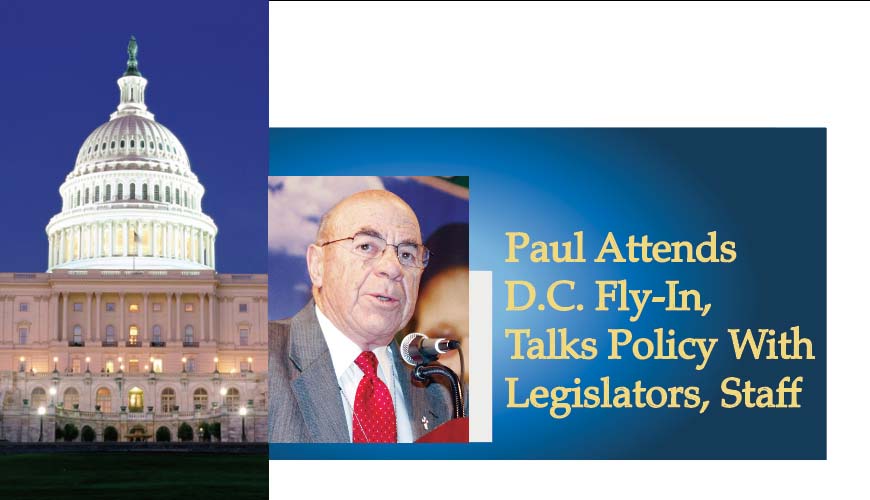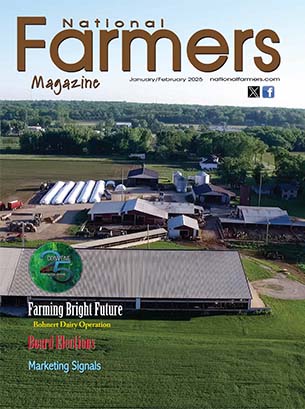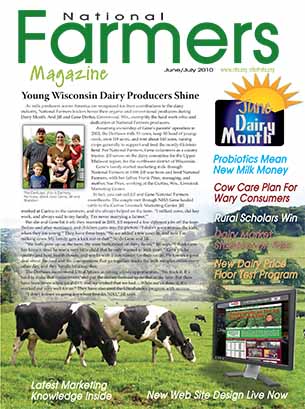National Farmers Legislative Coordinator Gene Paul flew to Washington, D.C., in early September to talk with farm policy influencers as part of the National Farmers Union fly-in. He spoke with National Farmers Communications Director Perry Garner about his trip.
Perry: Gene, tell us about the fly-in.
Gene: Over the course of the week of September 12, about 300 people attended hundreds of Congressional meetings with over a dozen federal agencies and directly participated in discussions with Secretary of Agriculture Tom Vilsack, Federal Trade Commission Chair Lina Khan, Assistant Attorney General Jonathan Kanter, and Commodity Futures Trading Commission Chair Rostin Behnam, among other leaders.
I’ve been traveling to Washington, D.C., for more than five decades and this event is a great way to better understand what key ag legislators are thinking and we have a chance to influence their priorities by talking with them.
Perry: What are NFU’s legislative priorities?
Gene: It’s a relatively long list. From fairness for farmers and 2023 farm bill priorities to climate, conservation and biofuels, there were a lot of issues on the table.
NFU’s Fairness for Farmers campaign brings the impact corporate monopolies have on family agriculture right up to the front of the issue stack. The campaign calls for legislative and regulatory reforms and urges family farmers and ranchers to tell their stories about how corporate monopolies have affected them.
Special Investigator Act
NFU wanted attendees to ask senators to pass the bipartisan Meat and Poultry Special Investigator Act (S. 3870) on the Senate floor. As you know, the Senate Agriculture Committee approved the bill in July.
The Packers and Stockyards Act (PSA) is a 100-year-old law originally designed to protect farmers, ranchers, and consumers from misleading and anti-competitive practices by meat packing companies.
The bill will create the Office of the Special Investigator for Competition Matters at USDA and would create a team to investigate and prosecute violations of PSA by meatpackers. They also advocated for the following:
• Minimize the barriers farmers deal with when they file legal challenges against meat companies under the PSA.
• Make clear which practices are discriminatory or deceptive under the PSA.
Country of Origin Labeling
Another standout issue was Country of Origin Labeling. National Farmers has long been an advocate of COOL, which allows clear and accurate food labels to help consumers decide exactly what they want and helps farmers and ranchers to set their products apart. Surveys show that Americans want to know where their food comes from, and farmers and ranchers want to provide them with that information.
Meat processors have fought against fair and accurate labels for several decades. Current laws allow imported beef neither born or raised in the U.S., but simply finished or processed in the U.S., to be labeled Product of the USA, which undermines consumer confidence in labels and may force prices lower for producers here in this country.
We believe Congress should reinstate COOL for beef by passing the American Beef Labeling Act. The bill would give the U.S. Trade Representative (USTR) a year to develop and implement it. If USTR fails to reinstate COOL for beef within one year of enactment, it would automatically be reinstated.
Biofuels
When it comes to biofuels, the growth of renewable energy use in transportation fuels has been a success story. NFU believes that for the U.S. to realize the full potential of the renewable energy sector, we should promote clean, higher-level blends of ethanol and advanced bio-based fuels. Experts say the path to increased ethanol usage is through high-octane, low-carbon fuel.
That’s why we advocated for the Next Generation Fuels Act, because it would achieve the goal of increasing the amount of ethanol blended into the nation’s gas tanks while reducing vehicle emissions. This legislation does this by establishing a minimum octane standard for gasoline and requiring new high-octane fuel to use low-carbon sources, further reducing greenhouse gas emissions (GHGs) from liquid fuels.
Perry: What’s likely to happen with the Farm Bill during the next several months?
Gene: NFU’s priorities for the new farm bill include programs in the commodity and crop insurance titles with changes that would:
• Move loan rates higher and other price-based triggers to reflect higher commodity prices and input costs.
• Make risk management products, like crop insurance, more accessible for specialty crop producers.
• Improve Whole Farm Revenue Protection to expand its use.
• Provide crop insurance discounts to farmers to raise cover crops or use other conservation strategies that increase resiliency and decrease risk.
• Authorize a program that gives farmers a reason to voluntarily remove marginal or environmentally sensitive agricultural land from production on an annual basis in exchange for an increased crop insurance guarantee.
But really, Perry, in reality not much is going to get done while everyone in Washington waits to see how the November midterms turn out. Then the new Congress won’t be seated until January. And then, they must appoint new committee leaders and members.
Perry: What should National Farmers be doing while Washington remains gridlocked?
Gene: Much as we need and appreciate sound farm policies, let’s not forget that we are primarily a marketing organization, and that comes first. The more time and effort we spend getting ready for tomorrow’s markets, and how we will be part of those markets, the better off organization member farmers will be.
So, we have great strides in growing our commodity marketing efforts, and we want to keep up the good work on growth.










